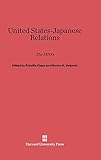United States-Japanese Relations : The 1970s / ed. by Priscilla Clapp, Morton H. Halperin.
Material type: TextPublisher: Cambridge, MA : Harvard University Press, [2013]Copyright date: ©1974Edition: Reprint 2014Description: 1 online resource (234 p.) : 8 tablesContent type:
TextPublisher: Cambridge, MA : Harvard University Press, [2013]Copyright date: ©1974Edition: Reprint 2014Description: 1 online resource (234 p.) : 8 tablesContent type: - 9780674419049
- 9780674419056
- 327.73/052
- E183.8.J3 C55
- online - DeGruyter
| Item type | Current library | Call number | URL | Status | Notes | Barcode | |
|---|---|---|---|---|---|---|---|
 eBook
eBook
|
Biblioteca "Angelicum" Pont. Univ. S.Tommaso d'Aquino Nuvola online | online - DeGruyter (Browse shelf(Opens below)) | Online access | Not for loan (Accesso limitato) | Accesso per gli utenti autorizzati / Access for authorized users | (dgr)9780674419056 |
Frontmatter -- Contents -- Foreword -- 1. Introduction: An Overview -- 2. Political Immobility and the Uncertain Future -- 3. U.S. Domestic Politics and Relations with Japan -- 4. Future U.S.-Japanese Economic Relations -- 5. Japan and the United States: Notes from the Devil's Advocate -- 6. Asian Economic Growth: The Influence of the United States and Japan -- 7. Summit Talks in Retrospect -- 8. The Normalization of Sino-Japanese Relations -- 9.Japan and China: Competitors in a Multipolar World? -- 10. Japan's Security in a Multipolar World -- 11. U. S.-Japanese Security Relations -- Notes -- Contributors
restricted access online access with authorization star
http://purl.org/coar/access_right/c_16ec
"This is clearly a time of significant transition in Japanese-American relations," Edwin O. Reischauer writes in his introduction to this timely and important book. "Are the prospects as alarming as some would argue, or is there more reason for hope?" In the penetrating essays that form this volume, the flashpoints for trouble are exposed so that we can understand the causes for the "great uneasiness" in American-Japanese relations:increasing economic rivalry, the emergence of a multipolar world, America's new interest in better relations with China and Russia, Japanese economic decline, and projected Japanese political instability. It would be easier to deal with these problems if American and Japanese cultural and political styles were similar. But they are not, and the resulting lack of communication and response is a serious handicap to solving mutual problems. In their diplomatic relations the Japanese try to avoid political confrontation and prefer to negotiate by indirection. Then, too, American images of Japan are skewed by layers of government and bureaucracy. Finally, Japanese consensus politics leads to immobility when Americans want action. The writers, in pointing out these differences, indicate how confusing all this is to U.S. policymakers. Despite these obstacles to friendship and understanding, a "cautious optimism" about the future pervades this book. The distinguished authors suggest a variety of ways to improve relations.Japan could and should take on more responsibility for Eastern stability and economic viability. In turn, the United States ought to recognize Japan as a major power with a large stake in Asia and to stress the complementarity of their economies.
Mode of access: Internet via World Wide Web.
In English.
Description based on online resource; title from PDF title page (publisher's Web site, viewed 29. Nov 2021)


